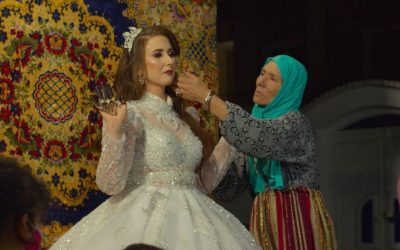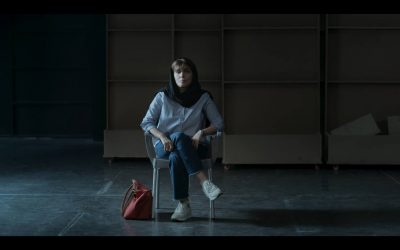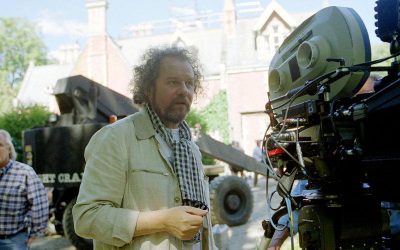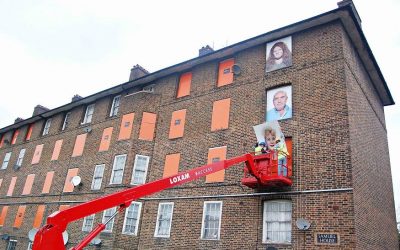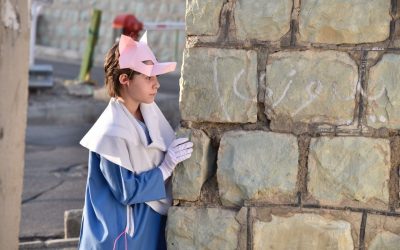Based on research and interviews with both Palestinian hunger strikers and asylum seekers, this absurdist yet realistic film stages a dialogue between the director in her mother tongue that centers on a single question: what do we know about hunger? This film is a poetic and musical tribute to those who suffered the aftermath of famine and migration, and to Palestinian hunger strikers whose resistance outlives the deafening silence of the colonial world. Filmmaker Diana Al-Halabi won the RTM Pitch Prize at IFFR 2023, which allowed her to realise this film.
Born in Lebanon; in 1990, Diana Al-Halabi is a Rotterdam-based visual artist and filmmaker. Through an intersectional feminist lens, Al-Halabi’s practice departs from the personal to the political and tackles notions such as the patriarchal gaze, institutional violence, bureaucracy, settler colonialism, and the visa regime. Her current research is on “Famine and Hunger Strikes: Decolonizing the Digestive System”. In addition to her artistic practice, she has also been involved in multiple activist initiatives and community projects. With her work, Al-Halabi aims to challenge dominant power structures and create spaces for resistance. Her works often use moving image, text, performance, and painting as a medium. In 2022, with a crossover to filmmaking, Al-Halabi’s film “The Disaster Cannot Be Contained” was screened in several film festivals, including IFFR, and was awarded as the best short for the national competition at the Beirut Shorts International Film Festival. In 2023, she was awarded the IFFR RTM PITCH Award for producing her short film “The Battle of Empty Stomachs” which premiered at the IFFR 2024. Al-Halabi holds an MFA from the Piet Zwart Institute in Rotterdam and has completed a one-year fellowship at Ashkal Alwan’s Homework space program in Beirut. Her work has been recently exhibited at Radius CCA Delft, Garage (Rotterdam), Kiosk (Ghent), Sursock Museum (Beirut), and many others.
RedCut: How did you start actively in the field of cinema?
Being a multidisciplinary artist, I find no medium that can truly fulfill me as a maker and speak to most arts as much as cinema does. When I develop an idea, it goes through many mediums before it arrives in the form of a moving image. My recent film “The Battle of Empty Stomachs,” for example, is a product of two years of artistic research under the title “Famine and Hunger Strikes: Decolonizing the Digestive System.”
Most of the scenes and the ideas in the film were a painting, a performance, an installation, or a text I exhibited in the past two years.

Diana Al-Halabi
To add the aspect of time to those mediums is to add maturity to the concept, to let those fractions of mediums that I use in my art collide into a complete medium called cinema, a medium that encompasses all other mediums, it’s not only the 7th art, it is the 7ths and all the 6 (and beyond) combined. By saying to add maturity, I don’t mean that mediums of art are immature if they stand on their own. It is to say that when they all belong to one topic and you can merge them with time and motion, then the concept is delivered to the audience with many hands, tongues, and faces, and that’s what makes this medium magical.
RedCut: How did you decide to revisit the past in your mother tongue and endure the torment of traumatic memories and bodily pain?
This film isn’t about my personal history, my past traumas, or the pain I’ve endured. Despite coming from a working-class background, I’ve never experienced hunger in my life, except during fasting as a Muslim child. That is stated in the film when my “mother tongue” asks me “What do you know about hunger?” and I respond “I once knew fasting.” I started the film with this dialogue to make it clear that, if I am speaking about hunger, that doesn’t mean I claim to know what it is.
This film as I mentioned earlier is the result of my 2-year research about famine and hunger strikes that, if juxtaposed, we can see how politicized our digestive system is. A siege inflicted by states can cause famine to subordinate a nation, and a political prisoner can fight an unjust system by staging a hunger strike. These two types of hunger are political, and so is hunger that is due to dire economic situations.
Throughout my research, I conducted interviews with two Palestinian hunger strikers to delve deeper into the subject matter. Every insight they shared was delicately woven into the fabric of the film. The scene where the prison guard removes the salt from the table symbolizes the practice in Israeli prisons of confiscating salt when a prisoner declares a hunger strike since they know that even the smallest amount of salt is crucial for a hunger striker to prevent rapid deterioration of their empty stomachs.
The coffee scene was a reference to how Israeli prisons use all the methods possible to force a hunger striker to break their strike without force-feeding them. Making coffee in large quantities, or even barbequing in the prison is one of their methods. It is a way to torture a hunger striker by stimulating their appetite.
Ribhi Karajeh, one of the Palestinian hunger strikers I spoke with, expressed that the chill induced by hunger can sometimes be more challenging than the hunger itself. Consequently, Israeli prison guards strip away blankets from hunger strikers, adding another layer to their torment.
The Palestine situation was the point of departure for this research in 2021. The juxtaposition between the siege endured by Gazans leading to the looming threat of famine (sadly unfolding presently in 2024), and the hunger strikes of imprisoned Palestinians, illustrates how colonial states exploit the digestive system as a political battleground, and how the digestive system is the first to be compromised and used against the resistance of indigenous people.
This film is also about escaping hunger – when is hunger a resistance, and when is it a weapon used against you? What does it mean to walk to Fortress Europe to find refuge? And what do people arriving here find? Perhaps that the game that plays our stomachs starts here?
My previous film was titled “The Disaster Cannot Be Contained.” I wish I could give this new film the same title, as containing the magnitude of these disasters through art feels almost impossible
RedCut: The issue of home, body, and security played a significant role in the film you mentioned, portraying individuals who resist and fight for security within their homes. The relationship between home, body, and resistance in this film was what to you? It seems like we all live within and outside power systems and apartheid. What’s your take on this?
I made this film to understand how our digestive system is tied to politics. How our choices to migrate or to stay are tied to politics. I think I distanced the film from my own experience regarding the search for security and migration because, even if I migrated to Europe in search of security and a passport that would provide me freedom of movement, I still didn’t experience the pain and fear of fleeing war to an unknown place. I experienced different pain, but not the one the film speaks about.
During the 2006 Israeli war on Lebanon, I looked at the people fleeing because they had a Western passport and I felt envy. I told myself that one day I want to claim such security. I worked so hard to be here and “buy” that security. I traveled to Europe in 2019 funded by GoFundMe campaigns. I became a folder of papers and financial evidence for the bureaucratic visa regime. But regardless of it all, I can’t say that the film has my experience. I didn’t ride the sea, I didn’t walk the forests. I landed in Schipol Airport.
One of the people I interviewed was Abed Al Hussein. He walked the forests of Europe for 20 days to arrive in the Netherlands. He experienced all kinds of fear, hunger, and insomnia in his journey. No matter how much I try through my film to picture what he told me about the forest and migrating to find refuge, I definitely won’t be able to speak of it all, even through abstraction.
Now many Gazans are facing genocide, those who are displaced from their sieged strip are left to the unknown, many people in Sudan are experiencing the worst famine, and many other countries are facing similar a fate. My take on it all is that we should utilize our platforms and take every chance to critique the apartheid system which decides who is worthy of life and who is not, who is seen as a human and thus granted security, and who is not.
RedCut: What is your new project? If you have a new film, please tell us a bit about the film’s story.
My next film will be about events taking place during a long call with the Immigration and Naturalization office in the Netherlands. It will encompass many topics that I am dealing with on a daily basis.


